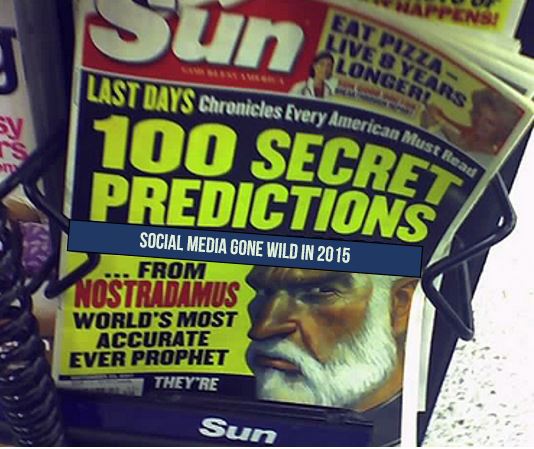
It’s a popular time to look into the crystal ball for the next year and make a few predictions. It is also what I love to do most … think about what’s next!
Here are some views of possible 2015 digital marketing trends that have my wheels turning.
1) The implications of Content Shock
By 2020, the amount of information on the web is expected to increase by 600%. The challenge of cutting through that overwhelming information density is THE marketing challenge for the next few years.
I see “information density” like a big hammer forging the innovations in our marketing world. Here are three possible implications of the intensifying “fight to be seen.”
- Business migration away from Facebook — The drop in organic reach has been apocalyptic for many businesses. Why? There is too much content on Facebook and the company is forced to ratchet down the reach. We will have to either spend a lot more money on Hollywood-quality content, a lot more money on advertising, or both, forcing some businesses to re-consider Facebook as a viable channel and enabling a migration to less noisy venues.
- Emergence of new content forms — As the web adapts and adopts to these new realities, it will drive innovations that help businesses stand out. I predict that we will see some interesting new content forms develop in 2015. One area ripe for innovation is interactive video.
- Fighting through filters — New apps and filters are emerging to help consumers make better content choices. As more people turn to these apps to sort the clutter, the marketer’s attention will turn toward the new challenge of getting messages through these new filters.
2) Malignant complexity and security marketing
One of my predictions for 2014 was that the malignant complexity of the web would open the door for more massive Internet security breaches … and unfortunately this prediction came true.
I think we are getting to the point where Internet safety will be an important and distinguishing point of marketing differentiation. Who will step forward and claim “The world’s safest online store (or credit card or social media platform)?”
Or, will that just put the target on your back for hackers?
3) Social media consolidation
Every social media platform faces similar challenges when it comes to increasing shareholder value — how do we increase the user base and leverage data for profits?
And here is what every platform knows — business would be a lot better if they could combine their data/software silos. Some tantalizing possible combinations might be Facebook + Pinterest or Google + Twitter.
There are a lot of egos involved in these companies but at some point the boards will take over and make rational decisions based on potential financial gains. Will that momentum occur in 2015?
4) Big Data for everyone
What does Big Data mean for a little business? Not much right now, but the potential is vast.
In 2015 I think we will begin to see complex data being presented in simpler, more accessible formats for smaller businesses. I am already starting to see sites that are aggregating statistics and data by category and online data-engines that take existing mountains of data and format it into accessible graphs and answers to queries from anyone.
Simplifying insane complexity will drive amazing new efficiencies and faster decision-making throughout the economy. It may also drive another huge wedge between developed and developing nations.
5) The double down on augmented reality
The opportunities presented by augmented reality promise to be more profound than the Internet itself.
But the progress seems to have stalled, at least with the most visible product, Google Glass. Developers and early Glass users are losing interest in the much-hyped, $1,500 test version of the product. Google has pushed back the Glass roll out to the mass market and is focusing on workplace applications.
Glass is still very crude and expensive compared to the functionality you can get on a smart phone. The battery life is short, the device overheats, and isn’t really true augmented reality.
Most of the truly immersive technologies are aimed at gaming but there are some other developments bubbling furiously away from the public view that are maybe a year or so away from mainstream applications. One leading developer told me that literally every Fortune 500 company has some sort of experimental AR activity going on.
With Facebook owning Oculus, I don’t think Google will walk away from Glass. In fact, I think we will see some announcement of a Glass 2.0 in 2015 or 2016.
We’re on the cusp of marketing’s most exciting era and Google will certainly be part of that. What does marketing look like when there are no boundaries?
Share your thoughts in the comment section. What are you excited about for 2015?
This post was written as part of the Dell Content Partners program, which provides news and analysis on technology, business and gadget-geek culture. I’ve been compensated to contribute to this program, but the opinions expressed in this post are my own and don’t necessarily represent Dell’s positions or strategies.